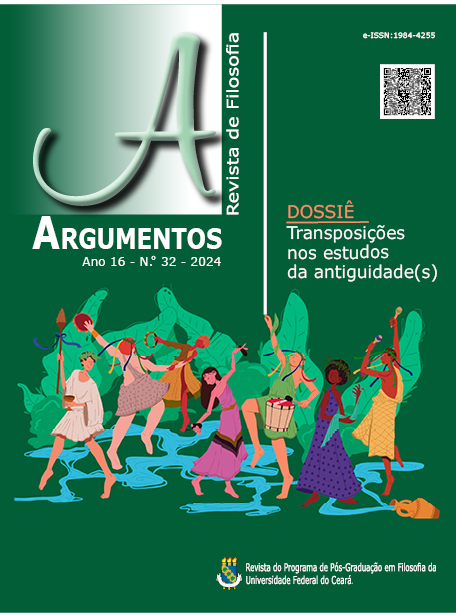Euripides, the poet of destructive passions
DOI:
https://doi.org/10.36517/Argumentos.16.32.93220Keywords:
Fragmentary plays. Gods. Passions. Family tensions.Abstract
The speculation that ancient and modern authors and scholars have made over the millennia about Euripides’ preference for female themes seems inexhaustible. Through this motif, the poet accompanied the evolution of Greek society and culture, symbolically transforming heroines of the past, configured by myth, into women subject to other historical contingencies and social criteria in use in Athenian 5th century BC. Of the many approaches to the subject, our reflection will focus on one particular perspective: female vulnerability in the face of harassment, the domestic, social or even political repercussions of an unwanted rape, family and social rejection, and the punishment meted out directly to the protagonist of the episode, condemned to exile or death; as well as, indirectly, the cruelty that targets an innocent child, whose future seems annihilated by the tensions reflected on him. There is no doubt that these issues reflected the concerns that were prevalent in Euripides’ universe, in the name of defending the dignity of families and preserving heritage.
Downloads
References
COLLARD, C.; CROPP, M. Euripides Fragments. Cambridge; Massachusetts; London: Harvard University Press, 2008.
COLLARD, C.; CROPP, M.; LEE, K. H. Euripides. Selected fragmentary plays. I. Oxford: Aris & Phillips, 2009.
HERZOG, R. Κακὸς εὐνάτωρ: divine rape on the tragic stage. Barnard College: PhD, 2015.
JOUAN, F.; VAN LOOY, H. Euripide. Fragments. VIII. Paris: Les Belles Lettres, 2000.
KARAMANOU, I. Euripides’ family reunion plays and their socio-political resonances. In:
ZIMMERMANN, B.; MARKANTONATOS, A. Crisis on stage. Tragedy and comedy in late fifthcentury Athens. Berlin; New York: De Gruyter, 2012. p. 239-250.
KARAMANOU, I. The Maiden’s Clash with her Natal Oikos in Euripides’ Lost Plays. In: Πρακτικά Διεθνούς Συμποσίου Αρχαίου Δράματος (Θεματική: Η Γυναίκα στο Αρχαίο Δράμα). Delfos, 2011. p. 153-61.
POWELL, A. Euripides, women and sexuality. London; New York: Routledge, 1990.
SILVA, M. F. Melanipa Sábia. Uma versão euripidiana de vícios femininos. In: Eupoikilon Anthos. Estudios sobre teatro griego en homenaje a Antonio Melero. Valência: Studia Philologica Valentina, 2016. p. 433-448.
TAPLIN, O. Pots and plays. Interactions between tragedy and Greek vase-painting of the fourth century B. C. Los Angeles: The J. Paul Getty Museum, 2007.
Downloads
Published
How to Cite
Issue
Section
License
Argumentos magazine is licensed under an International Creative Commons Attribution License.
The Magazine uses CC BY inclusion
1) The authors retain the copyright granted to the magazine or the right to initial publication, with the work regularly licensed under the Creative Commons Attribution, which allows the sharing of the work with acknowledgment of authorship and initial publication in this magazine.
2) The authors are authorized to contract additional applicable contracts, for non-exclusive distribution of the version of the work published in this journal (for example, publication in the institutional repository or as a chapter of the book), recognition of authorship and initial publication in this journal.
3) Authors are authorized and encourage to publish and distribute their work online (for example, in institutional repositories or on their personal pages) at any time before or during the editorial process, as they can generate productive changes, as well as increase the impact and reference of published work.




.jpg)










._._3.png)
1.jpg)
._._._.png)
